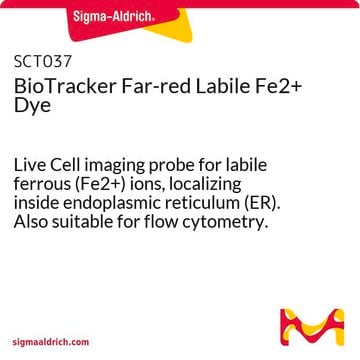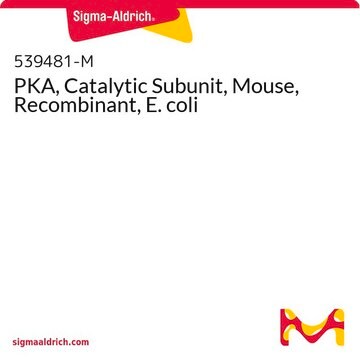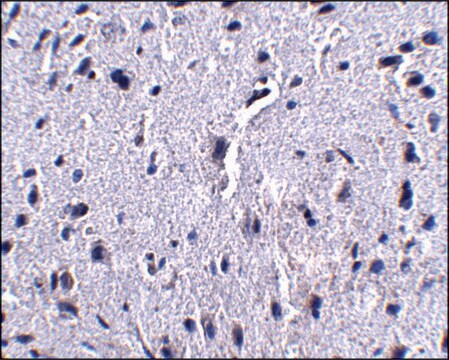14-309
PCAF Protein, Active, 50 µg
PCAF recombinant GST fusion protein, for use in Histone Acetyltransferase Assays. (HAT).
Autenticatiper visualizzare i prezzi riservati alla tua organizzazione & contrattuali
About This Item
Codice UNSPSC:
12352202
eCl@ss:
32160405
NACRES:
NA.32
Prodotti consigliati
Ricombinante
expressed in E. coli
Livello qualitativo
PM
Mw 79 kDa
Produttore/marchio commerciale
Upstate®
tecniche
activity assay: suitable (histone acetyltransferase (HAT))
N° accesso NCBI
N° accesso UniProt
Condizioni di spedizione
dry ice
Descrizione generale
Product Source: expressed in E. Coli corresponding to amino acids 352-832
Qualità
routinely evaluated by acetylation of core histones in vitro
Altre note
For Specific Activity data, refer to the Certificate of Analysis for individual lots of this enzyme.
Note legali
UPSTATE is a registered trademark of Merck KGaA, Darmstadt, Germany
Codice della classe di stoccaggio
10 - Combustible liquids
Classe di pericolosità dell'acqua (WGK)
WGK 1
Certificati d'analisi (COA)
Cerca il Certificati d'analisi (COA) digitando il numero di lotto/batch corrispondente. I numeri di lotto o di batch sono stampati sull'etichetta dei prodotti dopo la parola ‘Lotto’ o ‘Batch’.
Possiedi già questo prodotto?
I documenti relativi ai prodotti acquistati recentemente sono disponibili nell’Archivio dei documenti.
Prabhat Kumar Purbey et al.
Molecular and cellular biology, 29(5), 1321-1337 (2008-12-24)
Special AT-rich binding protein 1 (SATB1) acts as a global regulator of gene expression by recruiting various corepressor or coactivator complexes, thereby establishing a unique chromatin structure at its genomic targets in a context-dependent manner. Although SATB1 acts predominantly as
Matteo Savoia et al.
FASEB journal : official publication of the Federation of American Societies for Experimental Biology, 33(3), 4107-4123 (2018-12-12)
The epigenetic enzyme p300/CBP-associated factor (PCAF) belongs to the GCN5-related N-acetyltransferase (GNAT) family together with GCN5. Although its transcriptional and post-translational function is well characterized, little is known about its properties as regulator of cell metabolism. Here, we report the
Giosalba Burgio et al.
Journal of enzyme inhibition and medicinal chemistry, 31(sup3), 75-82 (2016-07-09)
Histones and polyamines are important determinants of the chromatin structure. Histones form the core of nucleosome particles and their modification by acetylation of N-terminal tails is involved in chromatin structural changes and transcriptional regulation. Polyamines, including spermidine, are also targets
R L Schiltz et al.
The Journal of biological chemistry, 274(3), 1189-1192 (1999-01-09)
A number of transcriptional coactivators possess intrinsic histone acetylase activity, providing a direct link between hyperacetylated chromatin and transcriptional activation. We have determined the core histone residues acetylated in vitro by recombinant p300 and PCAF within mononucleosomes. p300 specifically acetylates
Steven E Lang et al.
Oncogene, 22(18), 2836-2841 (2003-05-14)
The adenovirus E1A oncoprotein stimulates cell growth and inhibits differentiation by deregulating the normal transcription program via interaction with positive and negative cellular effectors. E1A associates with transcriptional regulatory complexes containing p400 and TRRAP involved in chromatin remodeling and decondensation.
Il team dei nostri ricercatori vanta grande esperienza in tutte le aree della ricerca quali Life Science, scienza dei materiali, sintesi chimica, cromatografia, discipline analitiche, ecc..
Contatta l'Assistenza Tecnica.







